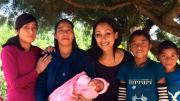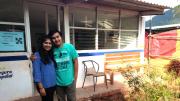Last January, Hanna Amanuel ’16 arrived in Sierra Madre de Chiapas, Mexico, with a strong interest in maternal health. Four months later, when she left the region, she had witnessed a home birth. “It was a very magical moment,” she recalled. “It’s different when you hear women’s stories about birth and when you actually see it in real life.” Amanuel was one of the first two Harvard undergraduates who spent their spring semester in rural southern Mexico as part of the Global Health Equity Option (GHEO) Scholars program, a new study-abroad opportunity that enables undergraduates with an interest in global health to learn in the field.
This past spring, Amanuel and Ishani Premaratne ’15, the other GHEO Scholar, juggled service in the local clinics, ethnographic fieldwork, and four virtual courses that Harvard professors tailored specifically to their experience abroad: a clinical ethnography course from Rabb professor of anthropology Arthur Kleinman, a health and human rights course from Harvard Medical School associate professor of global health and social medicine Joia Mukherjee, a political economy course from Florence professor of government James Robinson, and a religions in Central America course from Rudenstine professor for the study of Latin America David Carrasco. On top of the program’s requirements, Amanuel and Premaratne, who are both pre-med anthropology concentrators pursuing a secondary field in global health and health policy (GHHP), had to adjust to a new culture, community, and environment. Said Premaratne, “It was a perpetual learning experience.”
Administered by the Harvard Global Health Institute, a University-wide platform for global-health initiatives, the GHEO Scholars program promotes a combination of coursework and experiential learning. “What I hope is that students can integrate what they see on the ground with what they learn in the classroom and thereby develop a greater appreciation for health problems and potentials,” wrote Eckstein professor of applied economics David Cutler in an e-mail to Harvard Magazine. Cutler, a health-economics expert who received a grant from the President’s Innovation Fund for International Experiences to develop the study-abroad program, was also instrumental in establishing the undergraduate GHHP secondary field in 2010. (The secondary field replaced a certificate in public health that had been in place at the College since 2007.)
The study-abroad opportunity arrives at a time when interest in global health is burgeoning among undergraduates. According to data provided by GHHP program coordinator Christy Colburn, 103 students graduated with a secondary field in GHHP in 2014—approximately twice the size of the first cohort who fulfilled its requirements in 2011. Last year, GHHP was the largest secondary field at the College, with 117 members of the class of 2013 completing the required courses. Expanding Harvard’s global-health program has also been one of President Drew Faust’s stated priorities in the last few years.
The GHEO Scholars initiative in Sierra Madre de Chiapas resulted from a partnership between the Harvard Global Health Institute and Compañeros en Salud México (CES), a regional branch of the Boston-based umbrella organization Partners in Health—co-founded in 1987 by Kolokotrones University Professor of global health and social medicine Paul Farmer. Officially launched in 2012, CES now operates six clinical sites throughout Chiapas and collaborates with the Mexican government to improve healthcare access and delivery. Although Mexico offers universal health insurance, CES co-founder and chief clinical strategist Daniel Palazuelos noted that remote regions like Chiapas are largely excluded from the healthcare system. In addition to delivering primary care to the local population, half of whom live in poverty, his organization provides on-site training and mentorship to pasantes, recently graduated Mexican doctors fulfilling their mandatory social-service year. (The Mexican government requires all new physicians to spend some time serving a local community.) The pasantes who fulfill their requirement at one of the CES clinics work in partnership with Harvard medical residents interested in learning about primary healthcare delivery in a rural setting.
Palazuelos, who is also the assistant director of the Global Health Equity Residency at Brigham and Women’s Hospital (BWH) and an instructor at Harvard Medical School, said that CES profoundly transforms the pasantes’ conception of medicine. “They understand the social determinants of diseases,” he explained, adding that the CES training involves understanding the legal and economic factors affecting people’s health. Unlike other global-health organizations, “[CES] is very much designed and based on improving the existing healthcare system and making the existing healthcare system stronger,” noted Andrew van Wieren, a primary-care resident at BWH who has worked with CES for the past few years.
As Amanuel explained, the GHEO program is unique in that it allows students to work closely with the CES doctors as they provide patient care, an opportunity that is difficult for undergraduates to find in the United States. Both women, who lived near two different CES healthcare delivery sites, spent their mornings at the local clinics, observing and assisting the physicians. The study-abroad experience reinforced Amanuel’s commitment to promote reproductive health in Eritrea, where most of her family lives, and in neighboring countries.
Reflecting on her time abroad, Premaratne said that one of the most valuable aspects of her experience was being able to apply information from the virtual courses directly to her fieldwork. During her time in Chiapas, for example, she conducted primary research on health-seeking behavior among local women, which will be the topic of her senior thesis. “We know that [GHEO] is kind of an unorthodox program, but I think it’s really part of the greater move toward experiential learning,” she explained. “We hope that we are evidence of just how valuable [this program] is.”
According to Hugo Flores, CES co-founder and on-site director, the organization taught the GHEO Scholars the important role that familiarity with the local context plays in effective healthcare delivery. Flores described the women’s experiences as extremely successful, adding that programs like GHEO allow students to use the principles of global health to analyze real problems. Palazuelos said the GHEO program is a great way to provide undergraduates with a transformative educational experience, adding, “Who is a more powerful potential change agent than a Harvard student?”
As they learned about global health, Amanuel and Premaratne forged friendships with both the CES staff and members of their host communities. The two women mentioned that one of the biggest challenges they faced during their time in Chiapas was saying goodbye. “It’s so hard,” Premaratne said, “to leave an environment and a family you’ve become so close to.”











